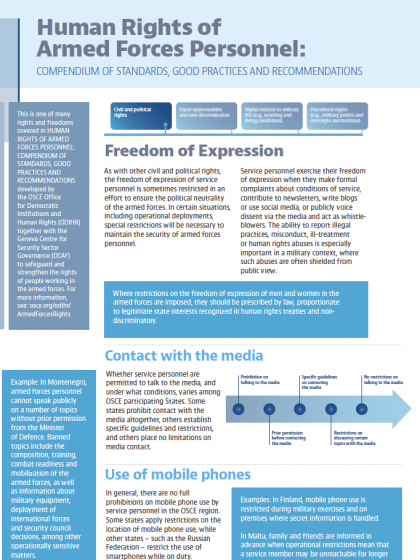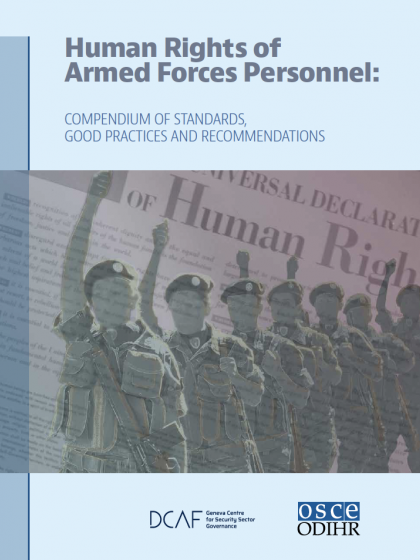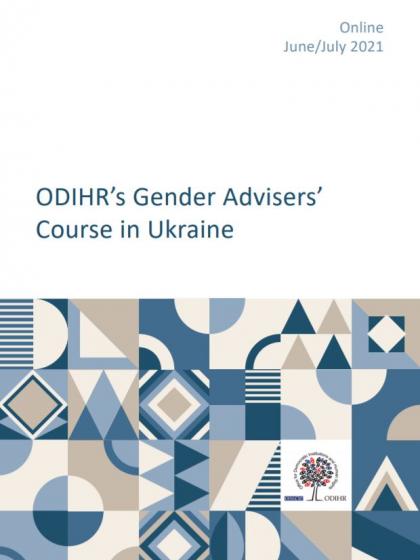Publications
Compendium on Human Rights of Armed Forces Personnel: Freedom of expression
Publishing date: 4 March 2021
Content type: Factsheet
Where we are: OSCE Office for Democratic Institutions and Human Rights
What we do: Human rights
Publisher: Organization for Security and Co-operation in Europe
As with other civil and political rights, the freedom of expression of service personnel is sometimes restricted in an effort to ensure the political neutrality of the armed forces. In certain situations, including operational deployments, special restrictions will be necessary to maintain the security of armed forces personnel.
Factsheet on OSCE Partners for Co-operation
Publishing date: 13 June 2014
Content type: Factsheet
Where we are: Partners for Co-operation
Publisher: Organization for Security and Co-operation in Europe
The Organization for Security and Cooperation in Europe (OSCE) is the world’s largest regional security organization, comprising 57 participating States across three continents – North America, Europe and Asia. Updated 13 June 2014.
Annual Progress Report on the Implementation of the OSCE 2004 Action Plan on the Promotion of Gender Equality- 2016
Publishing date: 2 October 2017
Content type: Annual report
Where we are: OSCE Secretariat
What we do: Gender equality
Publisher: Organization for Security and Co-operation in Europe
This Report highlights last year’s (2016) achievements as well as areas for further work in mainstreaming gender perspectives into the Organization’s policies, programmes and activities.
OSCE Annual Report 2014
Publishing date: 3 July 2015
Collections: OSCE Annual Reports
Content type: Annual report
Where we are: OSCE Secretary General, OSCE Secretariat
Publisher: Organization for Security and Co-operation in Europe
The OSCE Secretary General’s Annual Report gives an overview of the Organization's activities and its co-operation with partner states and other organizations.
An Assessment of the Establishment, Functioning, and Performance of Municipal Community Participation and Representation Mechanisms
Publishing date: 6 October 2021
Content type: Study / report
Where we are: OSCE Mission in Kosovo
Publisher: Organization for Security and Co-operation in Europe
The report provides insight into the legal and policy frameworks, as well as the establishment, functioning and composition of municipal mechanisms tasked with protecting and promoting the rights and interests of non-majority communities in Kosovo. The report observes that these mechanisms, the communities committee (CC), municipal office for communities and returns (MOCR), deputy mayor for communities (DMC), and deputy chairperson of the municipal assembly for communities (DCMAC), have demonstrated that they can be important advocates for the municipalities where they are operational and have produced clear substantive outputs with benefits to the communities they serve. This report therefore serves as an update to assess the development of these mechanisms since 2014 and provides a set of recommendations for improving the compliance and performance of these mechanisms in promoting and protecting communities’ rights in Kosovo.
Trafficking in Human Beings and Terrorism: Where and How They Intersect
Publishing date: 8 July 2021
Content type: Study / report
Where we are: Office of the Special Representative and Co-ordinator for Combating Trafficking in Human Beings
What we do: Combating trafficking in human beings
Publisher: Organization for Security and Co-operation in Europe
This paper explores the intersections between human trafficking and terrorism by analysing activities of terrorist groups through the lens of trafficking in human beings. Through a critical analysis of legal and policy regimes, the paper provides a comparative study of two crimes – human trafficking and terrorism – based on a series of illustrative examples collected from throughout the OSCE region. The outcome is a set of targeted recommendations to challenge the trafficking practices of terrorist groups by leveraging existing preventative and protective mechanisms in the anti-trafficking field. The intent of these recommendations is to support participating States in preventing the crime of trafficking by terrorist groups, hold the perpetrators fully accountable and protect victims.
Lustration in Albania: The past and the future
Publishing date: 17 February 2021
Content type: Study / report
Where we are: OSCE Presence in Albania
What we do: Human rights, Rule of law
Publisher: Organization for Security and Co-operation in Europe
Human Rights of Armed Forces Personnel: Compendium of standards, good practices and recommendations
Publishing date: 4 March 2021
Content type: Study / report
Where we are: OSCE Office for Democratic Institutions and Human Rights
Publisher: Organization for Security and Co-operation in Europe
This Compendium presents an overview of legislation, policies, and mechanisms for ensuring the protection and enforcement of the human rights and fundamental freedoms of armed forces personnel. It includes many examples and good practices from across the OSCE region that have proven successful. It also contains recommendations which can help participating States ensure that their policies and practices are in full compliance with international human rights standards and OSCE human dimension commitments.
Gender Adviser Course in Ukraine: Event brochure
Publishing date: 9 June 2021
Content type: Brochure
Where we are: OSCE Office for Democratic Institutions and Human Rights
What we do: Human rights, Gender equality, Youth
Publisher: Organization for Security and Co-operation in Europe
Discouraging the demand that fosters trafficking for the purpose of sexual exploitation
Publishing date: 10 June 2021
Content type: Study / report
Where we are: Office of the Special Representative and Co-ordinator for Combating Trafficking in Human Beings
What we do: Combating trafficking in human beings
Publisher: Organization for Security and Co-operation in Europe
This Occasional Paper highlights the importance of addressing the demand that fosters trafficking for sexual exploitation, in particular the exploitation of the prostitution of others. In doing so, it puts a spotlight on the role of demand in encouraging exploitation and causing harm to victims; outlines the scope of the international obligations and commitments of States to discourage demand; analyses the ways in which States have responded to these obligations and commitments in their criminal justice and prevention practices; and offers recommendations on how to better incorporate demand into national efforts. The primary aim of the paper is to support and enhance the implementation of State-led responses to demand.










